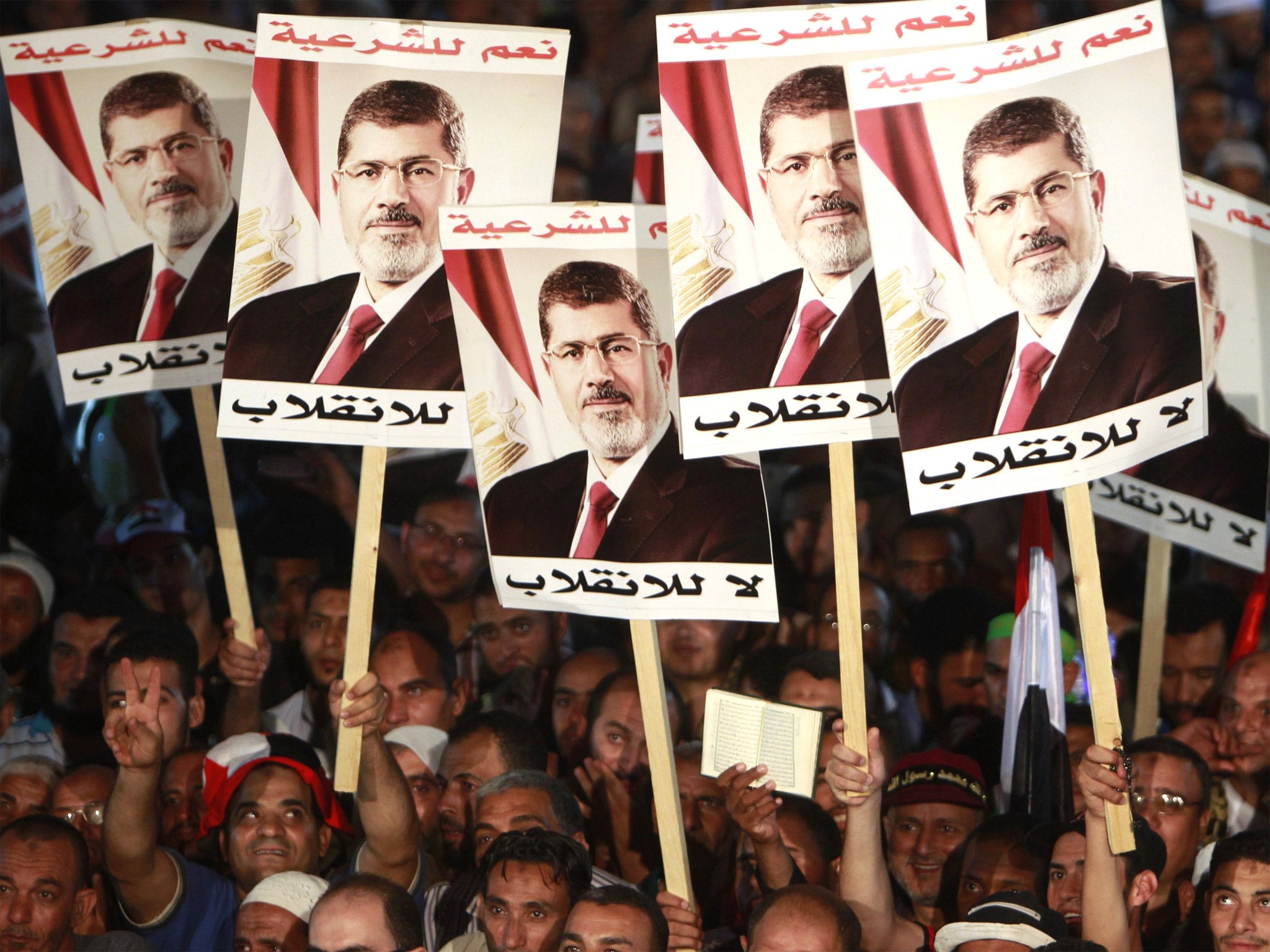Egypt crisis: Breakdown of peace talks leave country on brink of 'all-out war'
Interim president blames ousted Muslim Brotherhood for failure

Egyptians will celebrate one of the most significant days in the Muslim calendar this morning – but they will do so facing perhaps the gravest crisis since the fall of Hosni Mubarak two and a half years ago.
On the eve of the Eid al-Fitr festival, the holiday which marks the end of Ramadan, Egypt’s interim President, Adli Mansour, issued a bleak statement announcing that 10 days of talks to solve a dangerous impasse between supporters and opponents of Mohamed Morsi, the deposed leader, had failed.
The statement from Mr Mansour’s office declared that the Muslim Brotherhood – whose followers have been camped out in their thousands for more than a month on the streets of Cairo – was “fully responsible for the failure of these efforts”.
Following weeks of oscillation between threats of an anti-Islamist crackdown and gestures of apparent reconciliation, Mr Mansour’s words appeared to indicate that a state-led backlash against the Brotherhood might be imminent. “I’m sorry to say, but we’re closer to all-out war,” said Sherif Taher, a senior liberal politician.
A leading Brotherhood figure, speaking to The Independent, responded by calling the Egyptian authorities “vampires”. “They cannot satisfy their desire for blood,” said Essam el-Erian, the vice chairman of the Brotherhood’s political wing, who is currently wanted for arrest after prosecutors issued warrants for him and other Islamists.
He warned that the Egyptian government could “not imagine what would happen” if it tried to clear Mr Morsi’s supporters from the streets. But he added that Brotherhood protesters were peaceful and unarmed. “We don’t have anything. It will not be a battle. It will be a massacre,” he said.
Following the presidential statement, Egypt’s Prime Minister Hazem El Beblawi announced on state television that a decision had been taken to clear the Brotherhood from its two Cairo encampments. The decision, he added, was “irreversible”.
The day’s developments came after a week-long flurry of shuttle diplomacy designed to halt Egypt’s slide into further civil unrest.
Envoys from Europe, Washington and the Gulf states have been criss-crossing Cairo in an effort to bridge the ostensibly insurmountable positions held by hardliners on both sides.
Supporters of Mr Morsi have publicly said that they will rejoin the transitional “road map” only once the toppled president is restored to power and the Morsi-sponsored constitution of 2012 is resurrected.
Their opponents, who engineered last month’s popular coup because of fears of an Islamist autocracy, countered that such a move would be impossible. Amid the growing, media-fuelled climate of anti-Brotherhood loathing, many had increasingly come to reject the group altogether as a potential political partner.
Ikbal Baraka, an Egyptian writer, told The Independent that Egyptians were following the lead of Margaret Thatcher’s famous dictum to the IRA that Britain would never negotiate with terrorists – a reference to the belief among many liberals that the Brotherhood is little more than a network of would-be Islamist militants. “The Egyptian people have changed,” she said. “They will not accept that we will be friends with the Brotherhood and bury the hatchet.”
In a sign of the uncompromising mood among many of the group’s opponents, John McCain – the one-time US presidential candidate who was in Egypt to offer mediation alongside fellow Senator Lindsey Graham – triggered angry reactions from politicians and talk show hosts when he used a televised press conference to call for the release of detained Islamists.
Responding to Mr McCain, who later told a US interviewer that he “didn’t know” the political crisis in Egypt was “this bad”, Ahmed Said, the chairman of the liberal Free Egyptians Party, said that viewers had felt “insulted” watching the senator. “I’m telling you these two guys do not understand what Egypt is about,” he said.
Subscribe to Independent Premium to bookmark this article
Want to bookmark your favourite articles and stories to read or reference later? Start your Independent Premium subscription today.

Join our commenting forum
Join thought-provoking conversations, follow other Independent readers and see their replies